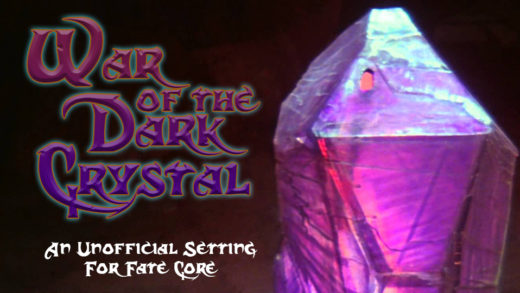A long-running game allows for an immersion device that is rarely utilized: the calendar. Today I examine how the passage of in-game time can enhance and affect a campaign.
Time Passages
Many campaigns are locked in a bubble of time; while holiday themed adventures may exist (to coincide with real world celebrations), many characters remain the same age since their creation. The world may change, but the player characters don’t. This isn’t talked about at the table, but it does enforce a lack of verisimilitude.
While the medium of popular comic books seems forced to reboot every so often to keep favorite characters young, the effect this has had on continuity and, due to that, fandom in general, has been volatile. Unless planned for (especially in a time-travel game), this volatility should not be a goal at the table. Consider a series of books or TV show. Time progresses and characters age and change; the cast of Supernatural look different than they did 13 seasons ago, and their characters personas have changed with both events and the calendar (while still retaining key traits).
The passing of in-game time on the characters should have an effect; one of those being the deeper engagement and involvement of the players.
The Calendar Keeper
Through the campaign, someone will need to keep track of time; while this is often the GM, some players may offer to be the “Calendar Keeper.” Having a player offering to assist can help ground the other players, so that the passage of time isn’t an enemy that can’t be fought, but a group acknowledgement that, no matter how fantastical, certain pieces of life will always exist; and that includes the passage of time. If a player is willing, I highly suggest working with them to be a CK.
Anniversaries & Events
Keeping the calendar means knowing what events occur on the calendar as well as how the calendar affects the lives of a player. This doesn’t mean a calendar event day should supercede the adventure itself; most people have had to work on their birthday or over a holiday. However, the acknowledgement that the character is doing something on the anniversary of something that happened in their past can add a personal context to the adventure. It also helps players think of a richer character background as they look for events to populate within their character’s personal calendar.
Because table-top time and game time flows differently, this can mean that a major holiday, like Christmas, could occur in-game during table-top’s July. Or that a Halloween-themed adventure might want to be embarked upon during the in-game summer. My advice would be to let it happen; have the characters light their menorah during the player’s July and run a spooky adventure during the character’s summer. Keeping calendar consistency can be more fun than bubble or “flashback” episodes.
Ageing
As calendar days increase in game, so should the age of the characters. Characters that began the game in their 20’s may reach their 50’s or 60’s by the end of the campaign. Some systems may have aging rules; your players may or may not want to incorporate them. Personally, I find such rules a little ageist, and normally dispense with them. Characters aging helps enforce the idea that their personalities should not be static—they should be shaped by events. It may also encourage the players to have their characters for relationships and sire a progeny, which can lead to additional role-play opportunities.
Unless reaching the upper tiers of age for their race and gender, aging itself should not be a factor against the character. Consider Roger Murtaugh of the Lethal Weapon movie series: even in the first movie he was complaining about how he was “too old for this shit.” As How I Met Your Mother pointed out, he may have complained, but even in the fourth movie, eleven years later, he was still doing that shit.
That said, depending on how time passes in the game (or the race of the character—more on that in a bit) and the length of the campaign at the table, it may eventually be time to retire a character. This should be seen as a good thing, a way for players to try something new or even play a similar character with a different twist or angle.
It may be tempting, depending on the campaign, to de-age the character with high science or magic. If done, it can raise some interesting role-playing as others are forced to deal with a younger version of the person they know, while they haven’t aged. However, despite the temptation, I don’t recommend it. Having no consequence for aging reduces the player investment in their character; that safety net rarely helps.
Fantasy and Alien Races
Game that offers multiple race options typically have different life spans for a given race. Introducing a calendar into a campaign can help highlight exactly what that means; an elf might live for hundreds of years and the knowledge that the calendar is not as large an enemy might make them take the long view; while the human character might want to limit planning. A shorter-lived character such as a goblin or ratfolk may act immediately without planning; given how precious every day may seem. It may be easy to read about and hypothesize how the variable aging of races may affect their thoughts, but it can feel that much more real when the calendar is also occurring in-game.
In A Travel Campaign
Road trip, starship, ocean voyages, etc. Some campaigns are made up of characters traveling from one place to the next and travel takes time. If implementing a calendar into a travel campaign, consider adding more personal or intra-travel escapades as characters go from point A to point B. Incorporating an in-game calendar doesn’t mean that every day has be accommodated and noted, but weeks or months should not pass without any sort of incident; even if that incident is short role-playing session with their characters performing daily routines. This may mean that a given adventure takes more sessions than usual, so I would recommend only incorporating a calendar system into a travel campaign with a stable group (meeting regularly and consistently).
The Time Between Adventures
Some campaigns are more adventure-focused and a variable amount of time passes from one successful mission to the next. Like a travel campaign, this means that events and aging can happen outside of the scope of the shared campaign. And, unlike the travel campaigns, the point is not to have a slow-down between the more action/plot-focused points. For this type of campaign, a calendar may not seem like a good idea, but if players are willing it doesn’t completely discount the concept. This may often mean a brief interlude before starting the adventure specifically to check the age of the characters and determine the in-game date of the new adventure. Unlike viewing the campaign with a TV show’s pacing, the campaign should be viewed like a series of movies, with each adventure being the next movie in the series. Characters still age and the calendar continues. This allows tweaks to a character’s personality from game to game as events occurred for the characters even when the GM was not dictating the scene.



Recent Comments